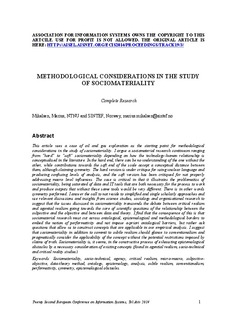| dc.contributor.author | Mikalsen, Marius | |
| dc.date.accessioned | 2014-09-23T09:16:58Z | |
| dc.date.accessioned | 2016-07-07T09:04:31Z | |
| dc.date.available | 2014-09-23T09:16:58Z | |
| dc.date.available | 2016-07-07T09:04:31Z | |
| dc.date.issued | 2014 | |
| dc.identifier.citation | Avital, Michael; Leimeister, Jan Marco; Schultze, Ulrike [Eds.] Proceedings of the European Conference on Information Systems (ECIS) 2014, Tel Aviv, Israel, June 9-11, 2014, Association for Information Systems, 2014 | nb_NO |
| dc.identifier.isbn | 978-0-9915567-0-0 | |
| dc.identifier.uri | http://hdl.handle.net/11250/2395946 | |
| dc.description.abstract | This article uses a case of oil and gas exploration as the starting point for methodological considerations in the study of sociomateriality. I argu a sociomaterial research continuum ranging from "hard" to "soft" sociomateriality depending on how the technology-human relationship is conceptualised in the literature. In the hard end, there can be no understanding of the one without the other, while contributions towards the soft end of the scale accept a conceptual distance between them, although claiming symmetry. The hard version is under critiqu for using unclear language and producing confusing levels of analysis, and the soft version has been critiqud for not properly addressing macro level influnces. The case is critical in that it illustrates the problematics of sociomateriality, being saturated of data and IT tools that are both necessary for the process to work and produce outputs that without these same tools would be very different. There is in other words symmetry performed. I answer the call to not reside to simplified and single scholarly approaches and use relevant discussions and insights from science studies, sociology and organisational research to suggest that the issus discussed in sociomateriality transcends the debate between critical realism and agential realism going towards the core of scientific qustions of the relationship between the subjective and the objective and between data and theory. I find that the consequnce of this is that sociomaterial research must cut across ontological, epistemological and methodological borders to embed the notion of performativity and not impose a-priori ontological barriers, but rather ask qustions that allow us to construct concepts that are applicable in our empirical analysis. I suggest that sociomateriality in addition to commit to subtle realism should glance to conventionalism and pragmatically consider the applicability of the concept without restricting to claims of truth. Sociomateriality is, it seems, in the constructive process of exhausting epistemological obstacles by a necessary consideration of existing concepts (such as agential realism, sociotechnical and critical reality). | nb_NO |
| dc.language.iso | eng | nb_NO |
| dc.title | METHODOLOGICAL CONSIDERATIONS IN THE STUDY OF SOCIOMATERIALITY | nb_NO |
| dc.type | Chapter | nb_NO |
| dc.date.updated | 2014-09-23T09:16:59Z | |
| dc.description.version | acceptedVersion | |
| dc.identifier.cristin | 1154520 | |
| dc.relation.project | Norges forskningsråd: 213115 | nb_NO |
| dc.description.localcode | Author postprint | nb_NO |
